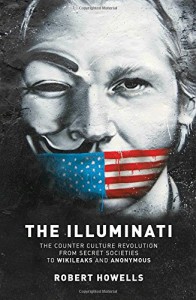Secrets, lies and conspiracies.

I obtained an ARC copy of this book through NetGalley and Watkins Publishing and I freely chose to review it.
I haven’t read any works of fiction related to the Illuminati but I came across them in my profession. I’m a psychiatrist and I’ve had several patients suffering from paranoid ideas that involved conspiracy theories and in more than one occasion they believed the Illuminati to be behind them. Although I read about them at the time, when I saw this book I felt curious and thought it would be a good chance to learn more.
The book isn’t exactly what I’d imagined. It does look at the history of the Illuminati movement — talking about its roots in the past and history, its relationship to religious and political movements and to big historical events (like the French Revolution) — and the latter part of the book links it to counter-revolution and counterculture up to the present time (with such phenomena as Anonymous, Wikileaks, digital piracy and hacking). This is not a critical account of the movement, as it is written by somebody with deep insider knowledge who appears to be a big believer and personally invested in the cause. I found the historical part interesting but also interspersed with plenty of detail about the process of indoctrination and their teachings, rather than individual facts. For me, it was more of a history of their ideas and philosophies rather than a detailed account of the movement and its people.
The modern part I found fascinating. Comparing many of the counter-cultural movements (beats, hippies, punk…) to the Illuminati, be it in their anti-institutionalised or anti-authority stances, or in their secret and anti-establishment nature (like hackers and Wikileaks) the author builds a strong argument for the continuity of the Illuminati’s philosophies in many of these groups and he makes a call for everybody to join in with their ideals of exposing corruption and removing the power from those who use it for personal benefit and don’t morally deserve it. Some of the arguments are very personal and down to the author’s interpretation, and as mentioned before, this is not a book that tries to expose both sides of the argument. I enjoyed the modern part and some of the comments and parallelisms it draws, although people who are strong believers in institutionalised religions might find it offensive, and some of its ideas can be too personal for others (his view of hackers and piracy might not be shared by many).
If readers are looking for an enthusiastic and eager discussion on the subject from somebody sympathetic to its tenets who expresses his opinion without hesitation, you will find it interesting, but it is not the book to read if one seeks a neutral or rigorously critical evaluation of the subject.







